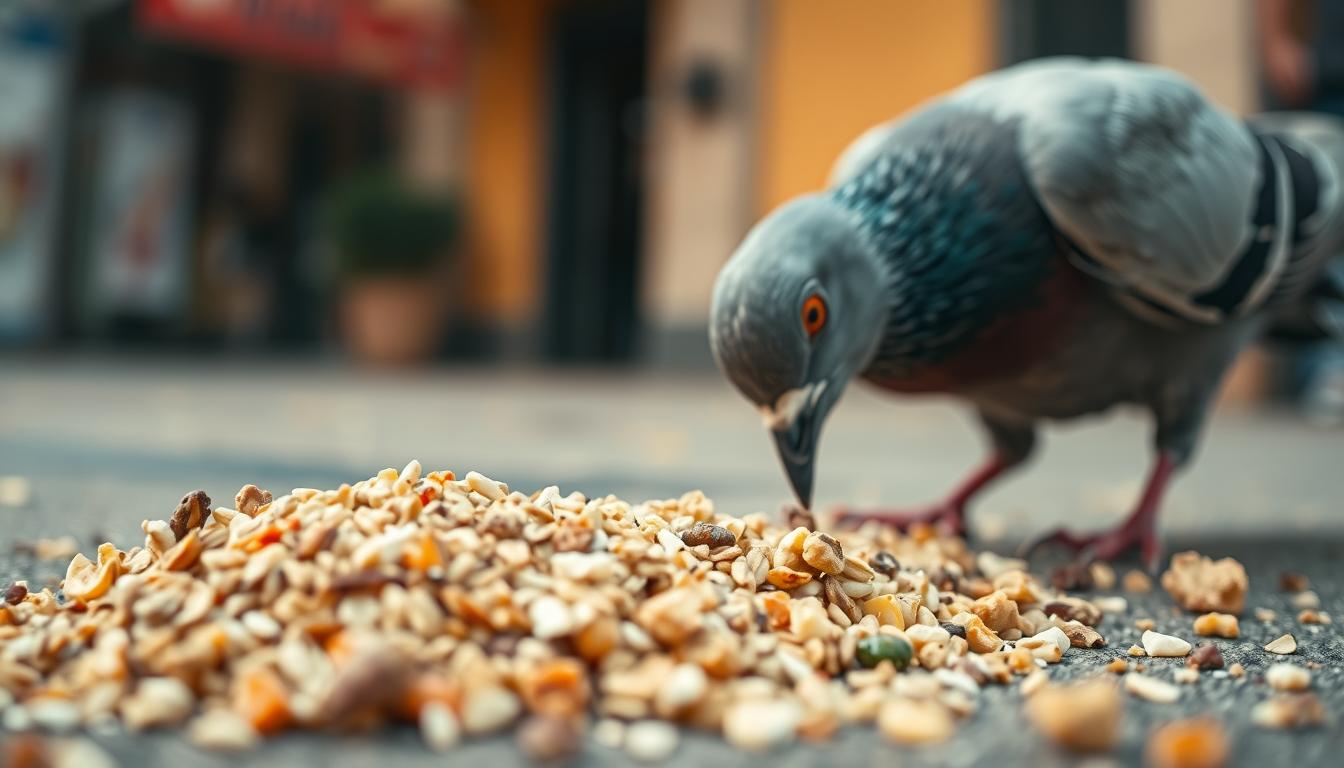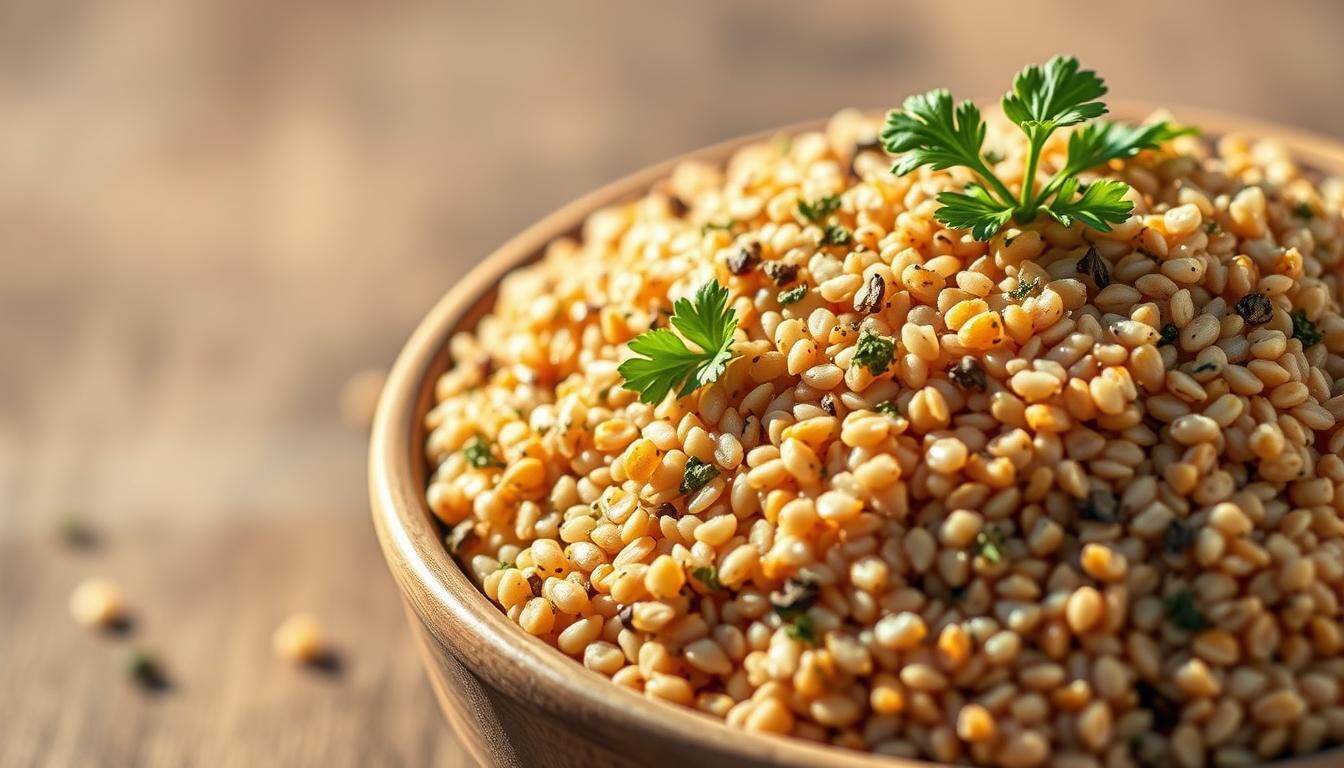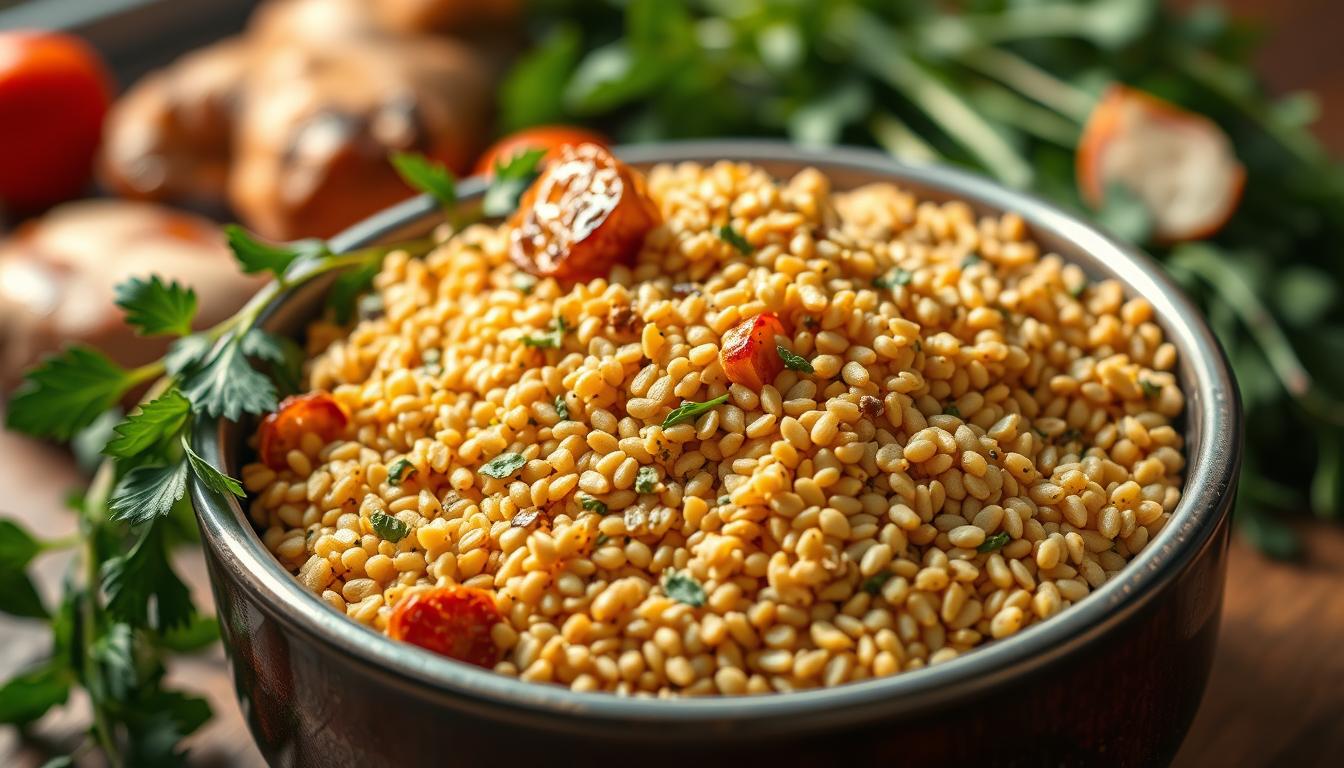Ever wondered what those city-dwelling birds pecking around street corners actually munch on? Understanding what pigeons eat isn’t just fascinating—it’s a window into their incredible urban survival skills. With a global population of approximately 400 million, these adaptable creatures have mastered the art of finding nourishment in the most unexpected places.
Your curiosity about the pigeon diet reveals something special about these remarkable birds. Whether you’re a wildlife enthusiast or simply intrigued by the feathered residents of your neighborhood, uncovering their culinary preferences can transform how you view these often-overlooked urban dwellers.
Our deep dive into what pigeons eat will surprise you. From common seeds to unexpected treats, these birds have nutritional preferences that might shock you. The pigeon diet is far more diverse and complex than you might imagine, with urban environments offering a smorgasbord of dining options for these resourceful creatures.
Get ready to explore the world of pigeon eating habits—a journey that will change how you look at these winged city inhabitants forever. From their favorite foods to surprising dietary quirks, we’ll uncover everything you need to know about what pigeons really eat.
Common Foods Pigeons Enjoy
Pigeons have a wide range of foods they like to eat. Knowing what they prefer can help us understand these urban birds better. They are not fussy, which helps them thrive in different places.
Seeds and Grains: A Staple Diet
Seeds and grains are a big part of a pigeon’s diet. These foods give them the energy they need. Here are some of their favorites:
- Sunflower seeds
- Wheat kernels
- Corn
- Millet
- Barley
Fruits and Vegetables: Nutritional Boosters
While seeds are a big part of their diet, pigeons also like fresh fruits and veggies. Softer fruits and vegetables add extra nutrients and water. Here are some good choices:
- Berries
- Chopped leafy greens
- Peas
- Diced apples
- Soft melons
Bread and Bakery Items: A Controversial Treat
Many people give pigeons bread, but experts say it’s not the best choice. Bread doesn’t have much nutritional value. It’s okay to give them a little as a treat, but it shouldn’t be their main food.
Less Expected Treats for Pigeons
Pigeons are surprisingly adaptable eaters with a diverse palate. While most people think of seeds and grains, these urban birds can enjoy a range of unexpected foods. These foods contribute to their pigeon nutrition. Exploring unique dietary options can help you understand their fascinating eating habits.
Cooked Pasta and Rice: Surprising Delights
When feeding pigeons, cooked pasta and rice can be nutritious treats. These foods are rich in carbohydrates. They provide energy for daily activities, easy-to-digest nutrients, and supplemental calories.
Nuts and Legumes: Protein-Packed Snacks
Nuts and legumes offer excellent protein sources for pigeons. When considering feeding pigeons these items, keep portions small. Ensure they are unsalted, finely crushed, and fresh.
Crushed Dog Food: An Unexpected Nutritional Boost
Surprisingly, crushed dog food can be a valuable protein supplement for pigeons. Choose high-quality, dry kibble that provides balanced nutrition. Remember, moderation is key in pigeon nutrition to maintain their overall health.
Foods Pigeons Dislike
Pigeons have specific food preferences, even in cities. They avoid certain foods, showing they’re not just opportunistic eaters. This reveals their unique urban pigeon diet.
Pigeons pick their food carefully to survive in cities. Their choices are not just about hunger. They also choose foods that make them feel safe and comfortable.
Spicy and Pungent Foods
Pigeons have sensitive stomachs. They don’t like foods with strong flavors. What humans find tasty can be too much for them:
- Extremely spicy peppers
- Garlic-based foods
- Strong onion preparations
Citrus Fruits and Acidic Items
Citrus fruits are a big no-no for pigeons. Their acidity and strong taste are off-putting:
- Lemons
- Oranges
- Grapefruit
Strongly Flavored Substances
Some strong smells keep pigeons away. Mint, lavender, and peppermint are effective at keeping them out of certain areas.
Knowing what pigeons like and dislike helps manage them. It shows respect for their natural behavior.
Nutritional Needs of Pigeons
It’s important to know about pigeon nutrition to keep them healthy and full of life. Pigeons need a diet that’s full of nutrients. This helps them stay strong and active.
Feeding pigeons is more than just giving them food. They need different nutrients to do well in cities and countryside alike.
Importance of Dietary Variety
Having a varied diet is crucial for pigeons. It keeps them healthy and stops them from getting sick. Here are some important foods:
- Grains: Corn, wheat, and barley
- Seeds: Sunflower, nyjer, and safflower
- Proteins: Peas and legumes
- Fruits and vegetables for added vitamins
Essential Nutrients for Healthy Pigeons
Pigeons need a mix of nutrients to stay energetic and healthy. Here are the main ones:
- Proteins: Important for muscles
- Carbohydrates: Their main energy source
- Fats: Good for feathers and energy
- Vitamins and Minerals: Boosts their immune system
Special pigeon feeds are made to give them the right mix of nutrients. This ensures they get the best diet for their lifestyle and energy needs.
Feeding Pigeons: Best Practices
Feeding pigeons the right way is key to their health. It’s important to think about how much to feed, what to feed them, and how to care for them.
Feeding pigeons responsibly means more than just throwing food at them. You must consider several important factors. This ensures they get the right nutrition and stay healthy.
Portion Control Matters
How much you feed pigeons is very important. Too much food can cause health problems. Here are some tips for feeding them right:
- Give them small, measured amounts of food
- Don’t feed them too often to avoid making them dependent
- Feed a mix of seeds, grains, and nutrients
- Watch how they look to see if they’re getting enough food
Water: The Essential Nutrient
Just like food, clean water is vital for pigeons. It helps them stay hydrated and healthy.
- Change the water every day to stop bacteria from growing
- Use shallow, clean containers for water
- Make sure the water is clean and free from harmful things
- Put water sources away from where you feed them
By following these tips, you can help pigeons get the nutrition they need. And you’ll be caring for urban wildlife responsibly.
Foods to Avoid
It’s important to know what pigeons shouldn’t eat to keep them healthy. Pigeons can eat a variety of foods, but some are very bad for them.
Toxic Foods That Harm Pigeons
Some foods can really hurt pigeons. Here are foods that are bad for them:
- Chocolate: It’s toxic to birds and can cause serious health problems
- Avocados: They have persin, which can harm their heart
- Apple and stone fruit seeds that have cyanide
- Caffeine, which messes with their nervous system
- Raw meats that spoil fast
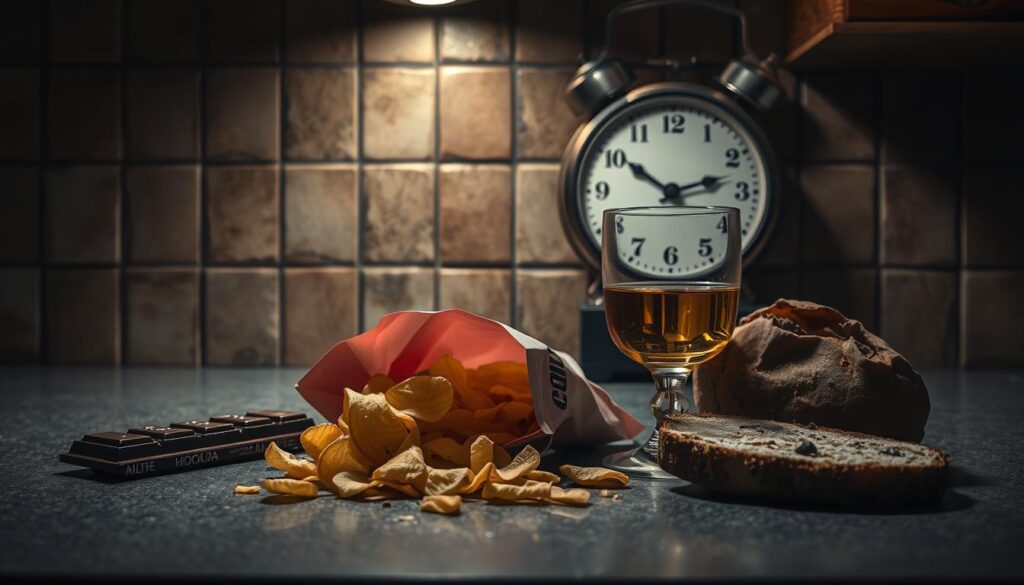
Risky Human Foods for Pigeons
Urban pigeons might find human food, but many items are bad for them. Bread, for example, has no good nutrients and can harm their health.
- Salty foods that mess with their electrolytes
- Dairy products they can’t digest
- Processed foods with harmful chemicals
- Moldy or spoiled food
- Sugary or fatty foods
When you feed pigeons, choose clean, fresh foods. This is the safest option for these urban birds.
Pigeons in Urban Environments
Urban areas have become a perfect home for pigeons. They have adapted their foraging habits to live among humans. This adaptation helps them survive in cities.
Pigeons are skilled at finding food in cities. They have learned to use many food sources:
- Scavenging food scraps from streets and sidewalks
- Exploring restaurant waste areas
- Utilizing park and public space food remnants
- Accessing human-provided feeding spots
Urban Food Discovery
These birds can spot food quickly in cities. They have a wide field of view and can see ultraviolet light. This helps them find food in busy urban areas.
Survival Strategies
City pigeons have learned to survive well. There are over 400 million pigeons worldwide, with over 1 million in New York City. They use buildings for nests and find food in cities that wild areas can’t offer.
Their diet includes many foods, making them successful in cities. They eat everything from park seeds to restaurant leftovers. Pigeons have turned city streets into their own feeding grounds.
Wild vs. Domestic Pigeons: Eating Habits
Pigeons are very adaptable in their eating habits, with wild and domestic birds showing different patterns. This shows how these birds can survive and do well in various places.
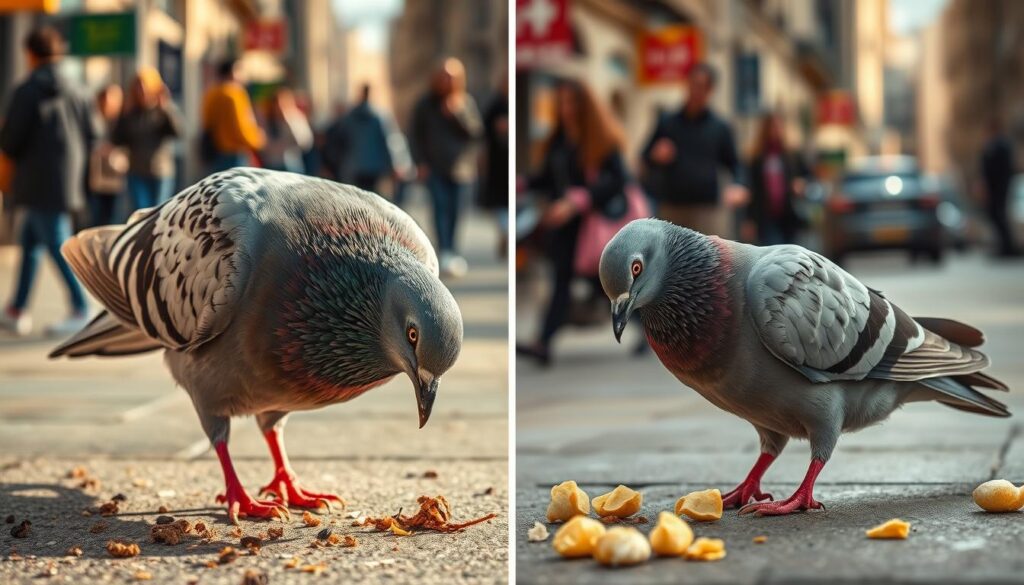
Feral pigeons eat differently in cities and in the wild. Wild pigeons forage naturally, while domestic ones have learned to eat from humans.
Natural Dietary Patterns
In the wild, pigeons eat a wide range of foods. This includes:
- Wild seeds and grains
- Insects and small invertebrates
- Native plant materials
- Seasonal fruits and berries
Urban Adaptations
In cities, pigeons have learned to eat human food. Their diet now includes:
- Human food scraps
- Discarded bakery items
- Street vendor leftovers
- Park and garden seeds
This shows pigeons’ amazing ability to adapt and survive in different places. Their flexibility in eating is a sign of their strong evolutionary skills.
Understanding Pigeon Preferences
Pigeons have unique and fascinating feeding behaviors. Their food choices are influenced by taste sensitivity and seasonal availability. This reveals a complex world of culinary preferences that might surprise you.
Pigeon feeding behavior is remarkably adaptive. These birds have sophisticated taste mechanisms. They identify nutritious and safe food sources.
Taste Sensitivity in Pigeons
Pigeons show remarkable taste discrimination. Their preferences are shaped by several key factors:
- Texture of food items
- Nutritional content
- Previous feeding experiences
- Environmental conditions
Seasonal Diet Changes
Pigeon diets change significantly throughout the year. In winter, they seek high-energy foods. Summer allows for more diverse nutritional intake.
These seasonal shifts show their ability to adapt to changing food availability.
Key seasonal diet variations include:
- Winter: Focus on calorie-dense seeds and grains
- Spring: Increased variety of fresh seeds and vegetation
- Summer: More insects and soft fruits
- Autumn: Preparation for winter with fat-rich foods
By understanding these nuanced preferences, you can better appreciate the sophisticated dietary world of these remarkable urban birds.
Conclusion: A Balanced Diet for Pigeons
Knowing about pigeon nutrition is key for those who care for these urban birds. How you feed them greatly affects their health and life span. A diet full of different nutrients helps keep their immune system strong and their overall health good.
Feeding pigeons needs careful thought about their special dietary needs. Pellets should be about 50% of their food, with fresh fruits, veggies, seeds, and sometimes protein. For example, carrots are great because they have beta-carotene for immune support and water for staying hydrated in cold weather.
Encouraging Healthy Eating Habits
When adding new foods, start slow and watch how they do. Regular weight checks and yearly vet visits are important for their health. It’s not just about how much you feed them, but what you feed them. Choose foods that are full of nutrients to meet their needs.
The Role of Human Interaction
Your knowledge of pigeon nutrition is vital for managing urban wildlife. By giving them the right food and keeping feeding areas clean, you help these birds stay healthy. Good feeding habits help pigeons do well in cities they share with humans.
FAQ
What do pigeons eat in the wild?
In the wild, pigeons mainly eat seeds, grains, and small insects. They look for seeds in grasses, weeds, and crops. They also eat small invertebrates and sometimes fruits and berries.
Can pigeons eat bread?
Pigeons can eat bread, but it’s not good for them. Bread has little nutrition and can harm their diet. Give them seeds, grains, and fruits instead.
Are there foods that are dangerous for pigeons?
Yes, foods like chocolate, avocado, caffeine, and alcohol are bad for pigeons. Spicy foods, citrus fruits, and foods with artificial seasonings can upset their stomachs. Always avoid giving them human food or anything toxic.
How often should I feed wild pigeons?
Feed wild pigeons only sometimes. Feeding them too much can make them dependent. If you do feed them, use bird seeds or grain mixes made for wild birds.
Do pigeons have different dietary needs in urban environments?
Urban pigeons eat a variety of foods, including human scraps. But, they still need a balanced diet with proteins, carbs, and nutrients.
What is the best food to feed pigeons?
Give pigeons unsalted sunflower seeds, millet, corn, wheat, and barley. You can also give them small amounts of fresh fruits and veggies. Make sure the food is clean and fresh.
Do pigeons need water when eating?
Yes, pigeons need clean water for drinking and staying hydrated. Provide a shallow, clean water source for them to drink and bathe.
How do pigeons’ diets change during breeding season?
During breeding, pigeons need more protein for egg production and chick care. They may eat more insects and protein-rich seeds. They might also need extra nutrients to stay healthy and care for their young.
Source Links
- Fascinating Pigeon Facts and Figures: 2024 Insights – https://www.ovocontrol.com/pigeon-facts-figures?srsltid=AfmBOop5ZJVDD3t44tGtV6U_EiXO_bnxA-ENYsmBa0Gf1dR611fkMsUQ
- Palomacy Pigeon & Dove Adoptions – https://www.pigeonrescue.org/
- Baby Pigeons: All You Need To Know (With Pictures) – https://birdfact.com/articles/baby-pigeons
- Nutritional Requirements for Racing Pigeons – https://starmilling.com/top-nutritional-requirements-racing-pigeons/
- What to do about pigeons – https://www.humaneworld.org/en/resources/what-do-about-pigeons
- Health Management Programs for all Stages of the Pigeon Year – https://www.auspigeonco.com.au/health-management-programs-for-all-stages-of-the-pigeon-year.html
- Fruits and Vegetables in Birds’ Diets | VCA Animal Hospitals – https://vcahospitals.com/know-your-pet/fruits-and-vegetables-in-bird-diets
- Expert reveals plant hated by pigeons that will keep them away – https://www.dailymail.co.uk/femail/gardening/article-13780793/Expert-reveals-plant-hated-pigeons-away-garden.html
- What do pigeons hate? – https://en.isuperman.tw/鴿子討厭什麼?/
- How to Keep Pigeons Away – Today’s Homeowner – https://todayshomeowner.com/pest-control/guides/how-to-keep-pigeons-away/
- Do pigeons eat nyjer seed? – https://shop.jacobijayne.com/blogs/news/do-pigeons-eat-nyjer-seed?srsltid=AfmBOooBKHsROH_K8xdozne_KOySUkecmUcCQ7iSA–XWRgsl9fFpV-M
- Pigeon Feeding Guide | Read Our Ultimate Guide – https://gladwellspet.co.uk/pigeon-feeding-guide/
- Food for short-beaked pigeons – Polskie Ziarno – https://www.polskieziarno.pl/en/product/karma-dla-golebi-krotkodziobow/?srsltid=AfmBOoriSsGppp9varAjnKc1qhALdTIVne0hpWvDpwo5VORmzUfa8dlh
- Which Human Foods are Bad for Birds? – Chirp Nature Center – https://chirpforbirds.com/wild-bird-resources/which-human-foods-are-bad-for-birds/?srsltid=AfmBOoqyqH_WIfEk8TZNPKsjxJ051p7ZTJLrFCuVi0r30dqOdk5NGj_M
- What human food can birds eat – https://www.livingwithbirds.com/tweetapedia/what-human-food-can-birds-eat
- 9 Foods You Should NEVER Feed to Birds – https://www.birdsandblooms.com/birding/attracting-birds/feeding-birds/can-birds-eat-bread/?srsltid=AfmBOorzKSNxwJOezhuSXUMfm_73odOm_HXmBaHVV1c8BZOxkBfgtHPR
- Pigeons: Unheralded Urban Marvels – https://campuslife.london.ac.uk/story/36550150/pigeons-unheralded-urban-marvels
- Fascinating Pigeon Facts and Figures: 2024 Insights – https://www.ovocontrol.com/pigeon-facts-figures?srsltid=AfmBOoq0tyhOaGjc6OE3RoddPitBp2y5xvAw1MlNP5mQ-iwZM9XLFMA3
- How City Birds Are Adapting to Urban Life in Surprising Ways – BirdWatching – https://www.birdwatchingdaily.com/beginners/birding-faq/how-city-birds-are-adapting-to-urban-life-in-surprising-ways/
- Fascinating Pigeon Facts and Figures: 2024 Insights – https://www.ovocontrol.com/pigeon-facts-figures?srsltid=AfmBOoosAkpEJdaxYCN1dl8jdeIEql1te9kWO0B542w_cABdvQZt6RXK
- Pigeon | Wildlife Illinois – https://wildlifeillinois.org/identify-wildlife/pigeon-or-rock-pigeon/
- Domestic pigeon – https://en.wikipedia.org/wiki/Domestic_pigeon
- Pigeon | Bird of Prey, Flight & Migration Patterns | Britannica – https://www.britannica.com/animal/pigeon
- Ethogram of the Pigeon – Great Lakes Pigeon Rescue – https://greatlakespigeonrescue.org/ethogram-of-the-pigeon/
- How to Raise Homing Pigeons – https://www.agriculture.com/family/living-the-country-life/how-to-raise-homing-pigeons
- The Benefits of Feeding Carrots to Racing Pigeons: A Secret from Jan de Wijs The Real Pigeon Boss | Pigeon Boss – https://www.pigeonboss.com/2148343_the-benefits-of-feeding-carrots-to-racing-pigeons-a-secret-from-jan-de-wijs-the-real-pigeon-boss?srsltid=AfmBOopYSK6M9F5R0scIRPGGYI0iQCx5__DlODJgp6dtJVKAYHunVyu4
- How Easy is it to Care for Pigeons? | PetMojo – https://www.petmojo.com/how-easy-is-it-to-care-for-pigeons/
- Do Pigeons Make Good Pets? Guidance, Facts & FAQs | PangoVet – https://pangovet.com/pet-lifestyle/birds/do-pigeons-make-good-pets/

